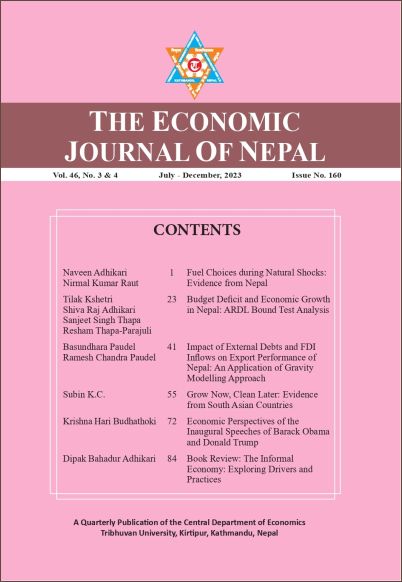Fuel Choices during Natural Shocks: Evidence from Nepal
DOI:
https://doi.org/10.3126/ejon.v46i3-4.73397Keywords:
Natural shocks, Clean energy, Household cooking, Nepal.Abstract
The adoption and use of clean cooking energy is a global and national priority; however, the household energy landscape of Nepal continues to rely heavily on biomass fuels like firewood, cow dung, and charcoal. Natural shocks can disrupt the utilization of relatively cleaner energy sources like biogas and liquefied petroleum gas (LPG). This study examines the impact of natural shocks on the adoption and usage of clean cooking fuels focusing on LPG. Using data from the third wave of the Household Risk and Vulnerability Survey 2018, logistic regression is employed to analyze both the likelihood of LPG adoption and household expenditure on LPG under conditions of natural shocks. The findings reveal that households experiencing natural shocks are 5 percent less on average likely to adopt biogas or LPG. Furthermore, household expenditure on LPG decreases by 4.43 percent relative to cooking fuel expenses particularly for firewood by the households experiencing natural shocks. This reduction highlights a decline in the intensity of clean energy use among households concurrently using LPG and firewood. These results underscore the negative effects of natural shocks on the transition to clean cooking fuels posing challenges to achieving sustainable adoption of clean energy solutions.
Downloads
Downloads
Published
How to Cite
Issue
Section
License
© Cedecon-TU




